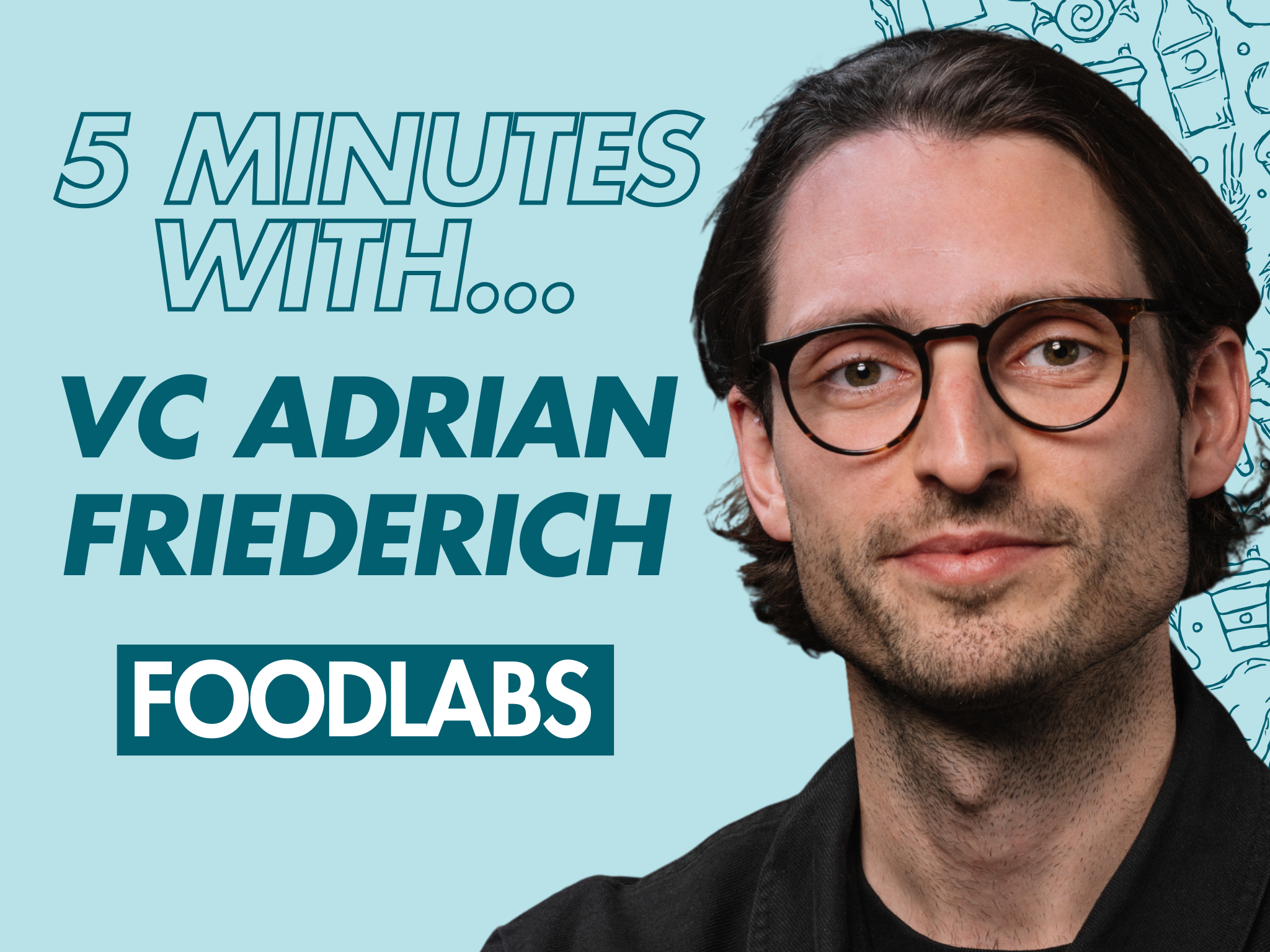
In our interview series, we quiz future food investors about the solutions that excite them the most, their favourite climate-forward restaurant, and what they look for in successful founders.
Adrian Friederich is the Principal at FoodLabs.
What future food technologies most excite you?
Real excitement lies where deep science meets AI, decoding nature’s complexity at scale. Think MicroHarvest’s continuous fermentation, Van Heron Labs’s AI-driven medium optimisation, or Pacifico Biolabs’s highest-quality and lowest-cost mycelium production.
These aren’t incremental improvements; they unlock entirely new food functionalities, pushing us beyond mimicry into next-gen nutrition and materials.
What are three future food verticals you are actively looking at for 2025?
- Novel crops and resilient inputs: Going beyond soy and wheat to crops with real agronomic and nutritional edge – think climate resilience, nitrogen fixation, and natural functionality. It’s about building a food system that’s shockproof, regenerative, and healthier for people and the planet.
- Food-as-medicine, made for everyone: Backing science-driven solutions that nourish and heal while focusing on underserved groups like women, older adults, and those navigating chronic conditions or navigating GLP-1 related metabolic changes. From precision nutrition to bioactive delivery systems and functional formulations.
- AI-powered ingredient design as an enabler: AI is fast-tracking how we understand and design food by predicting interactions, enhancing bioavailability, and bridging biology with formulation. It’s deep science, but applied faster for truly functional ingredients.
What do you consider the food tech sector’s greatest achievement in the past five years?
Trading buzzwords for breakthroughs. We’ve seen bold ideas mature into scalable, science-backed platforms under real-world constraints, whether in precision fermentation, molecular farming, or nature-based carbon removal like InPlanet does.
If you could wave a magic wand, how would you fix plant-based meat?
I’d rewire the protein matrix at the molecular level to mimic real muscle structure, while removing the dependency on ultra-processed binders. We need clean-label, scalable, delicious solutions. Ideally, one rooted in a local supply chain.
What’s the top trait you look for in a founder?
Relentless curiosity and hunger. The kind that drives a founder to challenge dogma, dive into the science, identify and open up markets, all while staying agile when plans inevitably evolve.
The One That Got Away: What is the deal you wish you had gotten into, but didn’t?
Basecamp Research is building the world’s largest biological database to design entirely new biological systems with a level of control and performance that’s way beyond the current standard. And it directly applies to food, whether it’s designing novel proteins with improved taste and nutrition, or engineering microbes that can produce sustainable ingredients more efficiently.
It’s deep science with real-world application, and they’re building a platform with the kind of defensibility and impact we would have loved to back early on.
What do you consider your most successful future food investment so far?
For me, success is about more than just a strong exit; it’s also about systemic impact. Backing a company like Pacifico Biolabs really stands out. They’ve managed to solve the key challenges in alternative protein: taste, texture, affordability, and overly processed ingredients.
Their Protein 3.0 platform isn’t just a better product; it’s a smarter system. By plugging into existing infrastructure, they’ve unlocked a path to scale that allows them to price competitively with meat, while avoiding its environmental and health drawbacks.
What has been your most disappointing investment so far?
We made an early investment in retail automation that, in hindsight, was just a bit too far ahead of its time. The team and vision were solid, but the ecosystem – affordable robotics and adaptable infrastructure – just wasn’t ready.
Today, that’s changing fast. Robotics are becoming cheaper and more accessible, unlocking exactly the kind of progress we hoped for back then.
What do people misunderstand/get wrong most about VC?
That we’re only here for capital deployment. The best VCs are true operating partners, ready to roll their sleeves up to create true outliers that redefine categories.
What is the most ‘future food’ thing you have eaten this month?
I recently tried the aardaker, a native European tuber that’s now being domesticated by Wageningen-based Aardaia. It offers triple the protein yield of soy and fixes nitrogen naturally, making it ideal for regenerative farming.
With a potato-like texture and subtle chestnut flavour, it’s versatile (think fries, mash, boiled or roasted), climate-resilient, and delicious. A prime example of nutrition, sustainability, and taste in one crop.
Where is your favourite climate-forward restaurant/dish/place to eat anywhere in the world?
Restaurant Nolla in Helsinki, a zero-waste restaurant offering seasonal flavours using local and organic ingredients only. The team is fantastic and creates outstanding dining experiences for their guests.
What’s your ‘why’? What motivates you to do what you do?
Food is foundational to health, culture and climate. Food systems have always changed, but will now inevitably do so at an accelerating pace as we find answers for the huge and growing challenges that we’re facing both on planetary and human health.
Supporting founders who are reshaping this system is a privilege. Every breakthrough we help scale brings us one step closer to a more resilient, healthy, and delicious future.
The post 5 Minutes with A Future Food VC: FoodLabs’s Adrian Friederich appeared first on Green Queen.
This post was originally published on Green Queen.